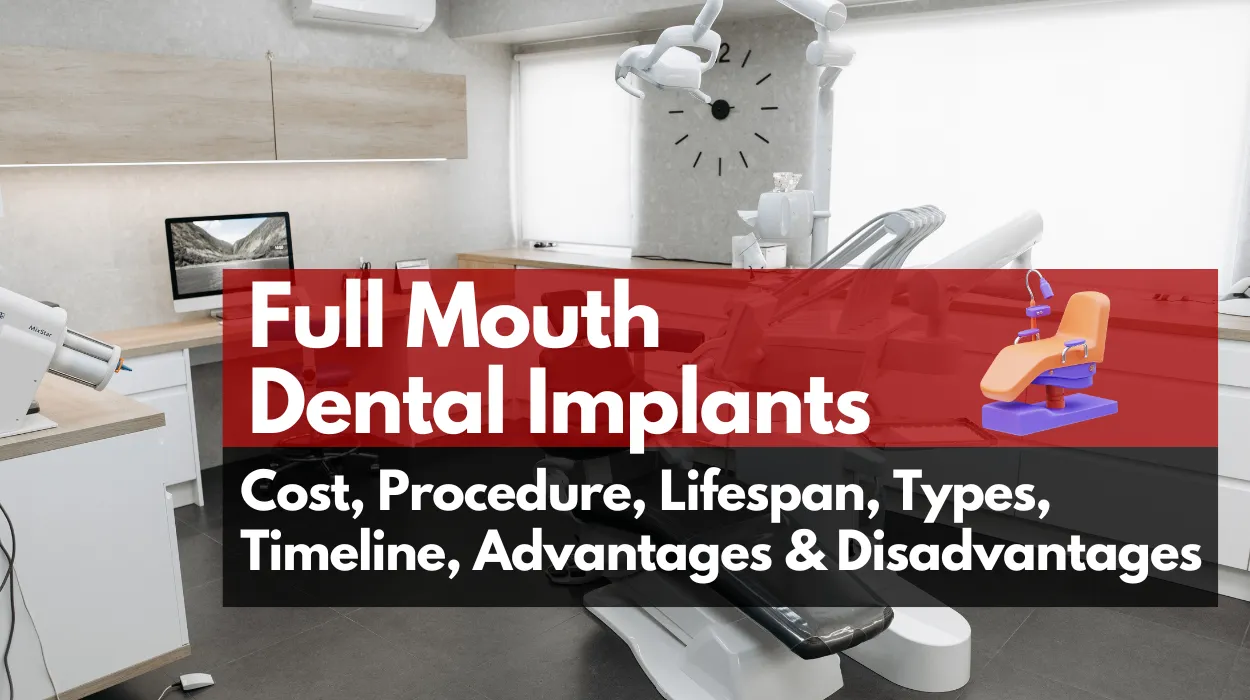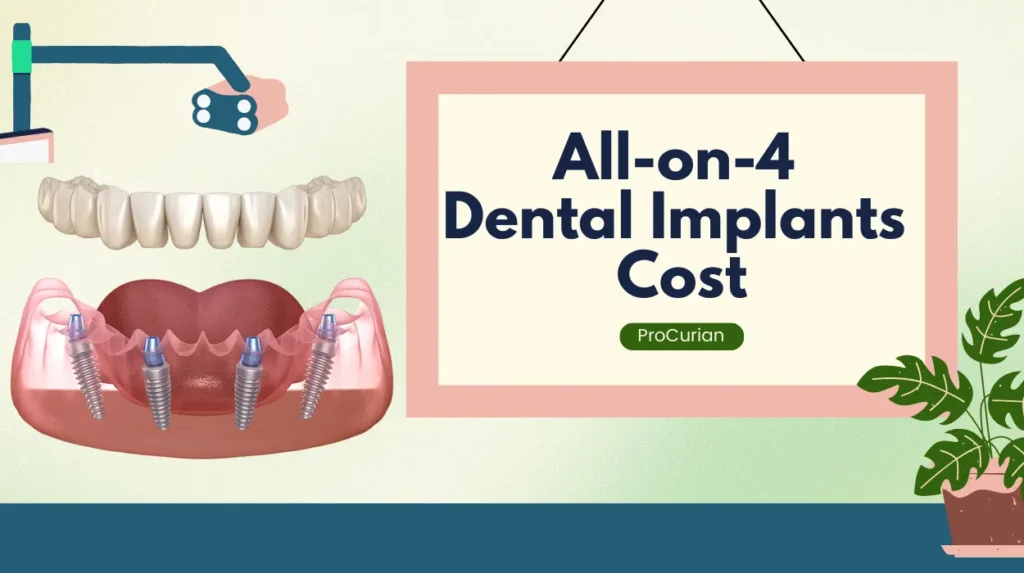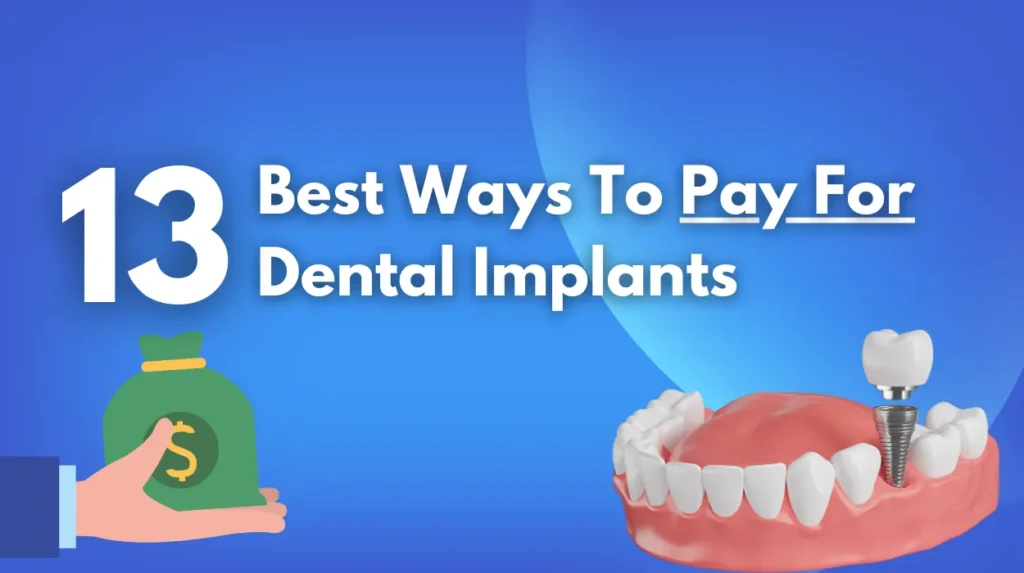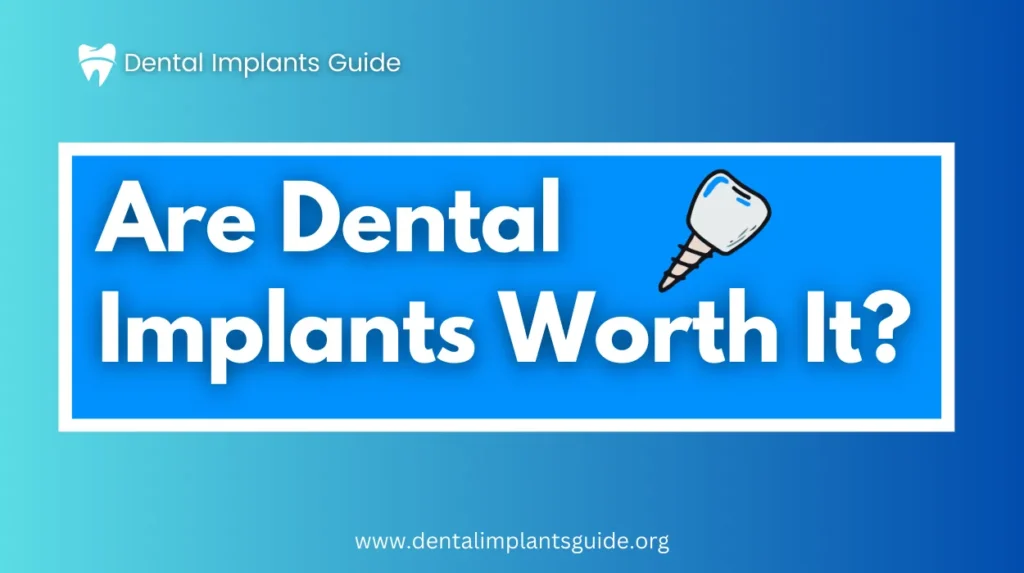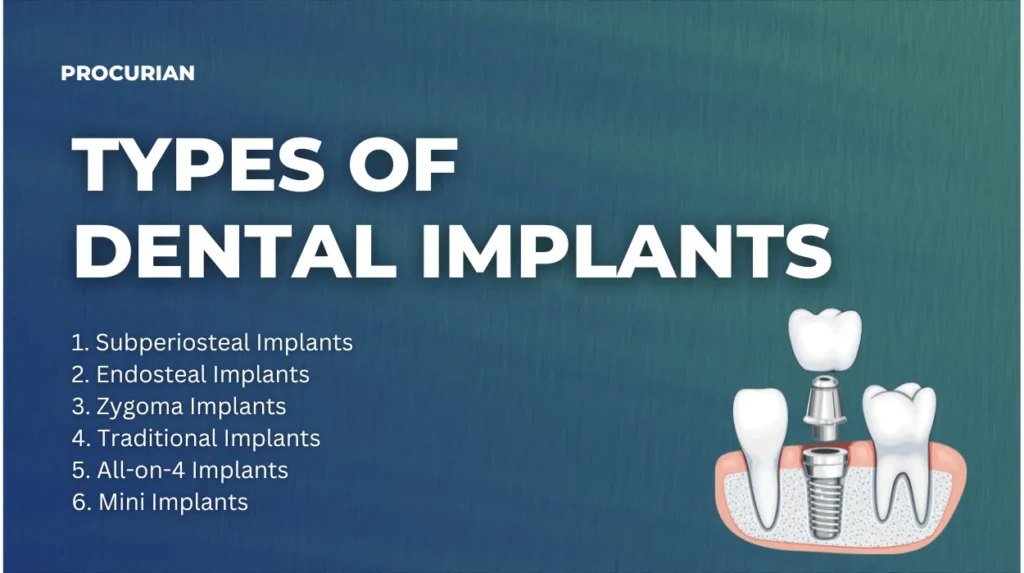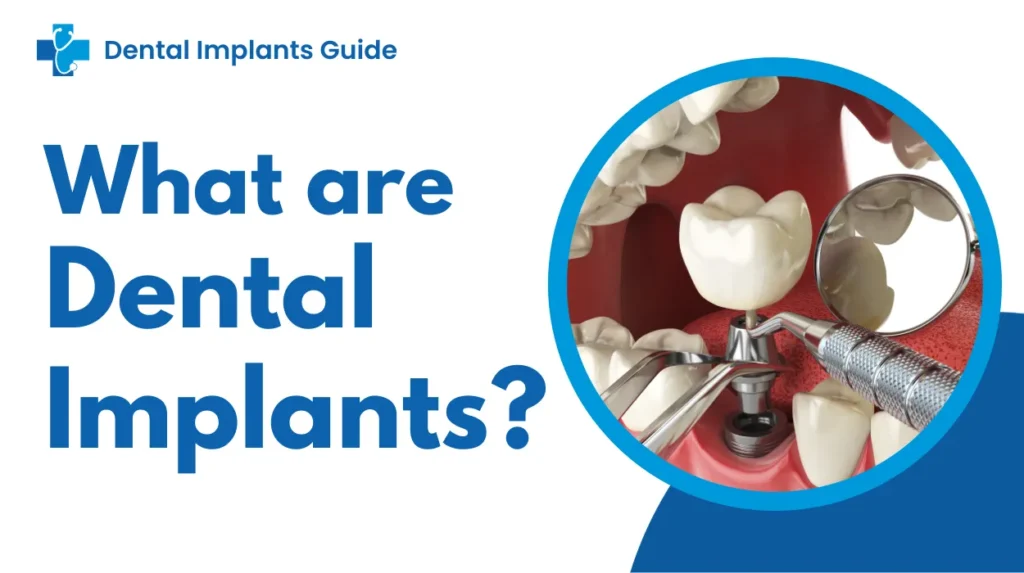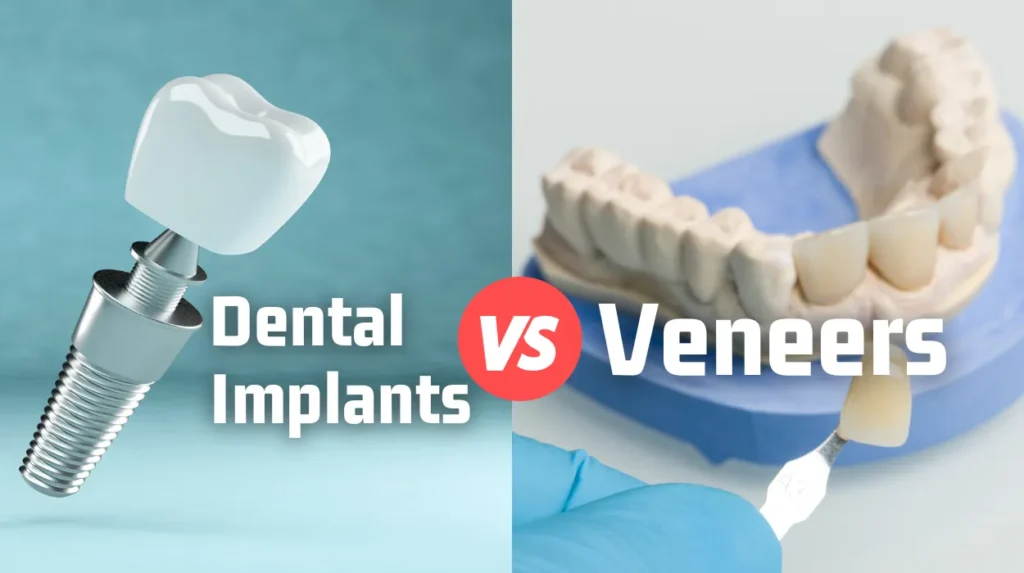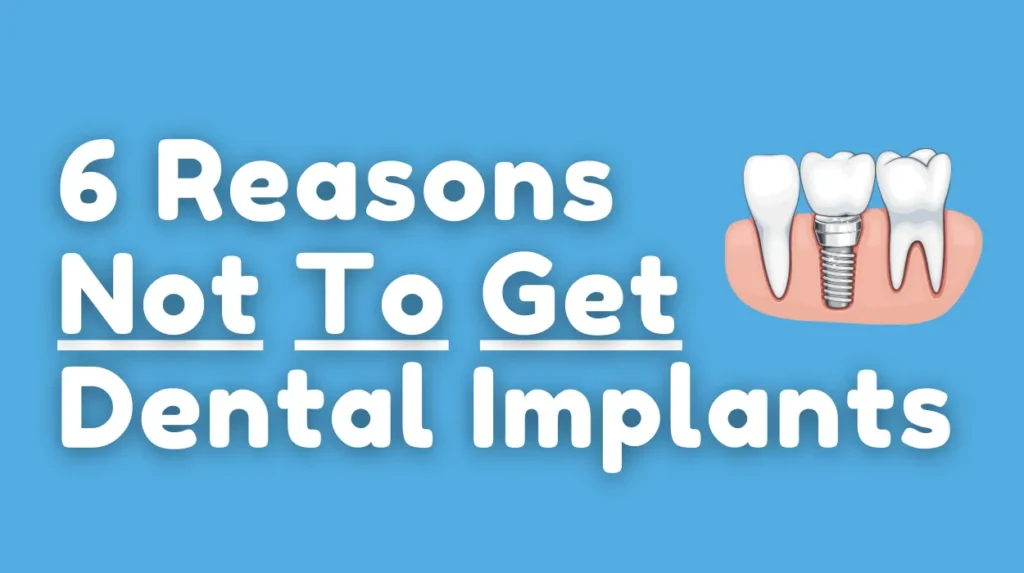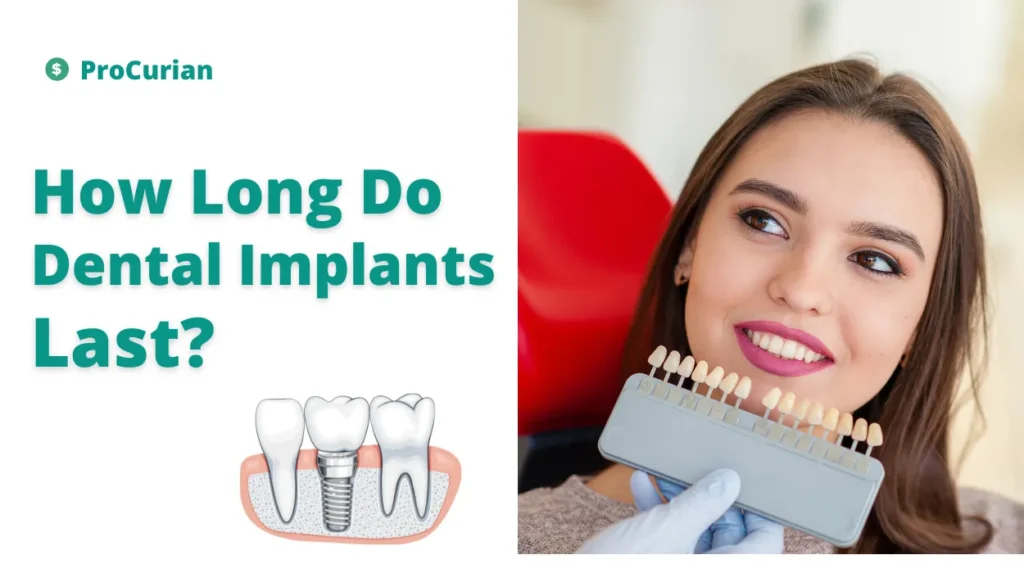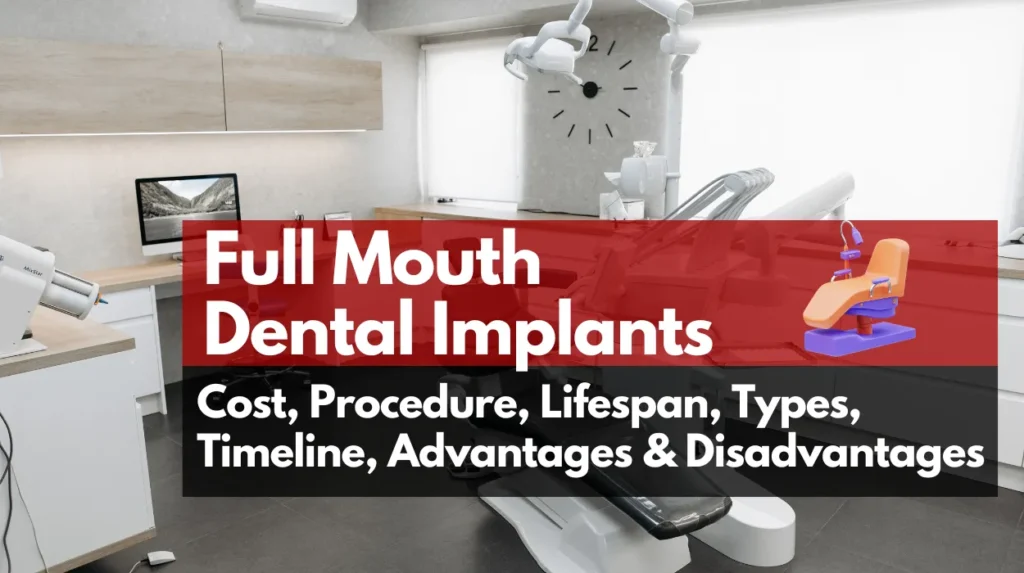
Are you tired of hiding your smile because of missing teeth? Maybe you struggle with ill-fitting dentures or bridges that make eating and talking a challenge. If this sounds like you, then full mouth dental implants could be the solution you’ve been waiting for.
We’ll go over everything about Full Mouth Dental Implants and its cost, procedure, lifespan, types & timeline We’ve got you covered on everything from what they are to the benefits and the process.
What Are Full Mouth Dental Implants?
Full mouth dental implants are a permanent solution for replacing missing teeth. They are like your natural teeth, except they’re made of strong materials like titanium and ceramic. Unlike dentures, they won’t slip or fall out, and you can care for them just like your real teeth.
A full mouth dental implant typically consists of three parts:
- The implant itself – This is a small titanium screw that acts as a replacement for your tooth’s root.
- The abutment – It connects the implant to the crown.
- The crown – This is the visible part that looks and functions like a natural tooth.
The combination of these three parts creates a strong and durable tooth replacement.
Why Would You Need Them?
There are several reasons why someone might consider full mouth dental implants:
If you’ve lost all or most of your teeth due to tooth decay, gum disease, injury, or any other reason, dental implants can be a fantastic solution. They’ll give you a full set of teeth that look and feel natural.
Some people struggle with traditional dentures. They can be uncomfortable, slip, or make it difficult to eat and speak. Dental implants can provide a more stable and comfortable alternative.
When you lose teeth, the jawbone can start to deteriorate. Dental implants stimulate the bone, preventing further loss and maintaining your facial structure.
Related Article: How Long Should I Take Antibiotics After Dental Implant?
Different types of Full Mouth Dental Implants
There are two main types of full mouth dental implants:
1. All-on-4 implants
All-on-4 implants are a type of implant that uses four to six implants to support a full arch of teeth. This type of implant is typically used for people who have lost all of their teeth in an upper or lower jaw.
2. Implant-supported dentures
Implant-supported dentures are a type of denture that is attached to dental implants. This type of denture is typically used for people who have lost some or all of their teeth in an upper or lower jaw.
Process of Getting Full Mouth Dental Implants
Getting full mouth dental implants is a multi-step process that typically involves the following stages:
Step 1: Consultation ➔ You meet with your dentist or oral surgeon to discuss your case and determine if you’re a suitable candidate for dental implants.
Step 2: Treatment Plan ➔ A personalized treatment plan is created based on your oral health, including the number of implants needed and the type of restoration (crowns, bridges, or dentures).
Step 3: Implant Placement ➔ The implants are surgically placed in your jawbone. Don’t worry; you’ll be comfortably numbed or even asleep for this part!
Step 4: Healing Time ➔ Your jawbone and the implants need time to fuse together. This healing period can take a few months, during which temporary teeth may be provided.
Step 5: Abutment Placement ➔ Once your implants are firmly anchored, abutments are attached to them. These will support the final crowns or dentures.
Step 6: Crown Placement ➔ The final step involves placing your custom-made crowns, bridges, or dentures. Your dentist will make sure they look and feel just right.
Step 7: Follow-up Visits ➔ Regular check-ups ensure everything is healing properly.
Timeline for Full Mouth Dental Implants:
- Initial Consultation (Week 1):
- Meet with a dental implant specialist.
- Discuss your oral health, needs, and goals.
- Receive an initial assessment.
- Treatment Planning (Week 2-3):
- Your dentist creates a personalized treatment plan.
- Detailed treatment options and costs are provided.
- You make decisions regarding the procedure.
- Implant Placement (Week 4-6):
- Surgical placement of dental implants into the jawbone.
- The number of implants varies based on your case.
- Local anesthesia or sedation ensures comfort.
- Osseointegration (Months 2-6):
- Implants gradually fuse with the jawbone.
- This period allows for a sturdy foundation to form.
- Soft diet during initial healing.
- Abutment Placement (Months 4-7):
- Abutments, connector pieces, are attached to implants.
- This prepares for the final restoration.
- Final Restoration (Months 6-9):
- Custom prosthetic teeth (crowns, bridges, or dentures) are crafted.
- They are securely attached to the abutments.
- Your new smile takes shape.
- Follow-up Visits (Ongoing):
- Regular check-ups ensure proper healing and success.
- Any necessary adjustments are made.
- You learn to care for your new implants.
- Long-Term Maintenance (Lifetime):
- Continue regular dental check-ups and cleanings.
- Maintain good oral hygiene for implant longevity.
- Enjoy the benefits of a confident, functional smile.
Related Article: What Causes Bone Loss Around Dental Implants?
Cost of Full Mouth Dental Implants
Full mouth dental implants cost anywhere from $20,000 to $45,000 per arch. The cost of full mouth dental implants varies depending on factors like location, the number of implants needed, and the type of restoration.
| Country | Average cost of full mouth dental implants |
|---|---|
| United States | $35,000-$65,000 |
| Canada | $30,000-$65,000 |
| United Kingdom | $30,000-$65,000 |
| Australia | $30,000-$65,000 |
Full mouth dental implants cost with insurance
Dental insurance plans often cover a portion of the cost of dental implants, typically ranging from 15% to 50% of the total cost.
Most dental insurance plans have an annual maximum benefit, which is the maximum amount they will pay for dental procedures in a calendar year. If the cost of full mouth dental implants exceeds your plan’s annual maximum, you will be responsible for covering the remaining expenses.
Dental insurance plans often have a network of preferred providers. Visiting an in-network dentist or oral surgeon may result in higher coverage levels compared to going out-of-network.
Advantages & Disadvantages of Full Mouth Dental Implants
The advantages of Full Mouth Dental Implants are:
| Advantages | Explanation |
|---|---|
| Natural Look and Feel | They blend seamlessly with your natural teeth. |
| Improved Chewing Ability | You can enjoy all your favorite foods again. |
| Long-Lasting Solution | With proper care, dental implants can last a lifetime. |
| Enhanced Oral Health | They don’t require altering nearby teeth. |
| Increased Comfort | No more worrying about denture discomfort. |
| Restored Self-Confidence | Smile confidently and feel better about yourself. |
The disadvantages of Full Mouth Dental Implants are:
| Disadvantages | Explanation |
|---|---|
| High Initial Cost | Implant procedures can be expensive upfront. |
| Surgical Procedure | Requires surgery, which may involve some risk. |
| Healing Time | The process can take several months to complete. |
| Bone Quality | Requires adequate jawbone density for success. |
| Implant Maintenance | Regular care and maintenance are necessary. |
| Not Suitable for All | Some individuals may not be suitable candidates. |
| Time-Consuming Process | The entire procedure can be time-intensive. |
Maintaining Your Full Mouth Dental Implants
Taking care of your dental implants is crucial to ensure they last a lifetime. Here are some simple steps to maintain your new smile:
1) Brush and Floss ➔ Treat your implants just like natural teeth. Brush at least twice a day and floss daily.
2) Regular Check-Ups ➔ Visit your dentist for routine check-ups to monitor your implants’ health.
3) Avoid Hard Foods ➔ Be cautious with hard or sticky foods that could damage your implants.
4) Quit Smoking ➔ Smoking can increase the risk of implant failure, so consider quitting if you’re a smoker.
How to get full mouth dental implants for free?
There are several ways to obtain free full mouth dental implants.
- Dental Schools ➔ Some dental schools offer low-cost or free dental implant procedures performed by students under supervision.
- Charity Programs ➔ Look for non-profit organizations or dental charities that provide free dental care to those in need.
- Clinical Trials ➔ Occasionally, you can participate in dental implant clinical trials, where you may receive free treatment in exchange for being a study participant.
- Insurance ➔ If you have dental insurance, check if it covers implants or offers financial assistance.
- Government Assistance ➔ In some cases, government programs may provide dental assistance to eligible individuals.
- Dental Grants ➔ Some organizations offer grants for dental treatments to individuals facing financial hardship. These grants can help offset the cost of treatment.
Is a full mouth of implants a good idea?
Yes, getting a full mouth of implants can be a good idea if you have lots of missing teeth and want a strong, natural-looking smile. Implants can help you eat better and feel more confident.
Related Article: 7 Best Alternatives to Dental Implants
How long does it take to recover from full mouth implants?
After the surgery, you might have some swelling and discomfort for a few days. It takes about 2 to 6 months for the implants to fuse with your jawbone.
Then, the dentist adds the new teeth, which might need some adjusting. It takes about 5-7 months for full mouth implants to fully heal.
During the healing process, you may experience some pain, swelling, and bleeding. This is normal, and it should subside within a few days or weeks.
Can you eat with full mouth dental implants?
Yes, you can eat with full mouth dental implants just like you eat with your real teeth. They’re strong and stable, so you can enjoy all your favorite foods without worries. It’s one of the great benefits of dental implants – you can eat comfortably and without restrictions!
Are full mouth implants better than dentures?
Yes, full mouth implants are often better than dentures. Implants stay in place, so they won’t slip or fall out when you eat or talk. They also look more natural and can last a lifetime with good care.
Dentures, on the other hand, may move around, need to be removed for cleaning, and can feel less comfortable. But it’s essential to talk to a dentist to see if implants are right for you because everyone’s situation is different.
FAQs
What are full mouth dental implants?
Dental implants replace missing teeth with artificial teeth that look and function like real ones.
How much do full mouth dental implants cost?
Full mouth dental implants cost ranges from $20,000 to $45,000 per arch.
How long does the implant process take?
The process can take 5 to 7 months due to healing time, but it’s worth it for a long-lasting smile.
Are dental implants painful?
During the procedure, you won’t feel pain, and any post-surgery discomfort can be managed with medication.
How long do dental implants last?
With proper care, dental implants can last a lifetime, making them a great investment in your oral health.
Final Words
Full mouth dental implants can transform your smile and your life.
I hope this guide has helped to clarify the world of dental implants and provide you with the information you need to make informed decisions about your oral health.
Remember, a beautiful, confident smile is within reach with the help of full mouth dental implants. If you’re considering this transformative procedure, consult with a trusted dentist or oral surgeon to start your journey toward a brighter, healthier smile.
